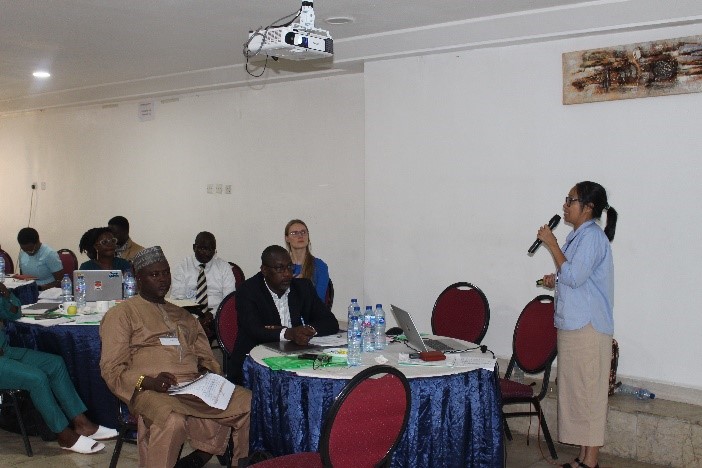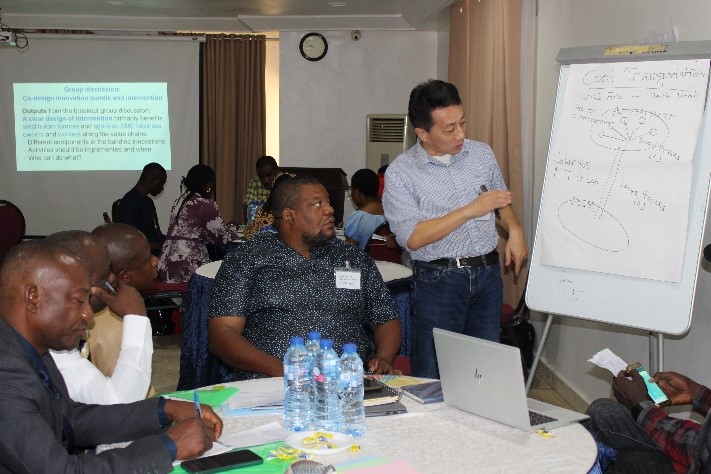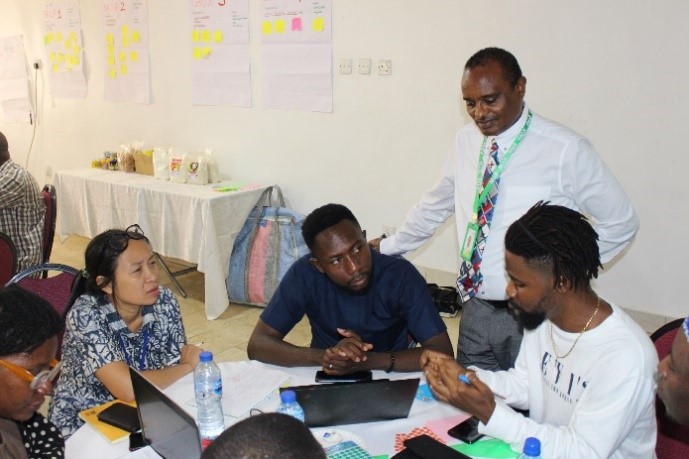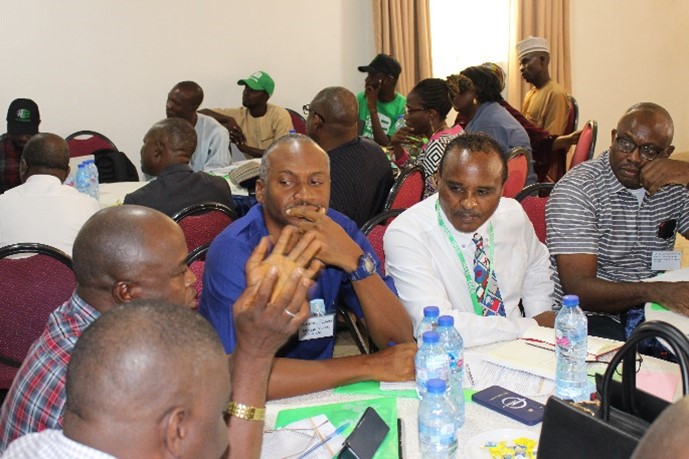

Photo credit: Omobolanle Onilogbo/IFPRI
The CGIAR Initiative on 'Rethinking Food Markets[1]', led by the International Food Policy Research Institute (IFPRI), organized a two-day (12-13 Dec. 2022) stakeholders workshop in Abuja, Nigeria. The workshop aims to engage with key stakeholders to kick-start the co-designing of innovations and interventions in 'Food Markets and Value Chains' to enhance employment opportunities and increase income for smallholders and SMEs along the agri-food value chains in Nigeria. Specifically, the workshop's objectives are: (1) to introduce the initiative to policymakers, implementing partners, and scaling stakeholders in Nigeria; (2) to share the findings from the Scoping Study in Nigeria with stakeholders and validate the results; (3) to co-identify and co-design innovations and interventions with partners for piloting in Nigeria; and (4) to kick-start bundling of innovations/interventions and learning between the different work packages within the Initiative.
About 50 participants drawn from the public sector (Federal and state Ministries of Agriculture); research institutes; private sector stakeholders from food value chains and logistics service providers; cooperative societies; farmers associations; value chain aggregators; agrotechnology organizations; and financial services providers in the agri-food sectors attended the workshop. The workshop was co-facilitated by IFPRI senior researchers Dr Bedru Balana, Research Fellow and the Initiative's Country Coordinator in Nigeria; Dr Futoshi Yamauchi, Senior Research Fellow; Hyacinth Edeh, IFPRI-Nigeria Country Program manager and the monitoring, evaluation, learning, impact assessment and scaling preparedness and actions (MELIA&SPA) team (Dr Minh Thai and Dr Mijra Michalscheck) from the International Water Management Institute (IWMI).
Minh Thai (left) and Futoshi Yamauchi (right) giving presentations at the workshop
Photo credit: Omobolanle Onilogbo/IFPRI
Participants discussing at the breakout group discussion sessions
Photo credit: Omobolanle Onilogbo/IFPRI
Dr Kwaw Andam, country program leader IFPRI-Nigeria and Mr Abubakar Haruna, representing the Federal Ministry of Agriculture and Rural Development (FMARD), delivered opening statements and welcome addresses. The Initiative leader and Director of the IFPRI's Markets, Trade and Institutions Division (MTID), Dr Rob Vos, introduced the overall goals and objectives of the CGAIR 'Rethinking Food Markets' Initiative and its particular significance in the context of agri-food value chains in Nigeria. Then, leaders of the two work packages (WPs) of the Initiative being implemented in Nigeria, Dr Futoshi Yamauchi (WP2) and Dr Kate Ambler (WP3), introduced their respective WPs to the participants. While WP2, entitled 'Innovation for inclusive and sustainable growth of domestic food value chains', focuses on vegetables and fruits value chains to improve participation and profitability of smallholder farmers and agri-food SMEs in domestic food value chains in Nigeria and lower their environmental footprint; WP3-Innovations and policy design for development for cross-value chain services to leverage new employment and income opportunities' focuses on understanding the employment and income potential of emerging innovations in cross-value chains logistics and financial services for agri-food value chain actors in the country.
Following the introduction of the Initiative and its two work packages, the research team shared the findings of the scoping studies from WP2 and WP3 with the stakeholders, followed by discussions and Q&A sessions. The second half of day one of the workshop focused on learning from the stakeholders (potential implementing partners) about their experiences, expectations, innovations, and capabilities to implement them. Accordingly, seven organizations[2] among the stakeholders invited to the workshop each gave presentations on the following key areas: (1) their key activities relevant to the Initiative's planned activities in Nigeria; (2) their key proposed innovations/interventions for testing/piloting in collaboration with the Initiative team; (3) bundling potential of their proposed innovations ; (4) their implementation strategies of the proposed innovations; (5) income and employment opportunities of the innovations to smallholder and SMEs; and (6) the potential to scaling, i.e., how scalable are their proposed innovations/interventions? The discussions and Q&A following partners' presentations were focused on the nature of the innovations, the potential for bundling, and implementation strategies.

Photo credit: Onilogbo Omobolanle/IFPRI
Day two of the workshop was dedicated to co-designing innovation bundles and interventions in breakout parallel group sessions in four innovation areas: (1) innovations in logistics services; (2) innovations in food processing and value additions; (3) innovations in quality standards, labeling, and certification; and (4) innovations in digital financial services (DFS). The parallel group discussions were followed by a plenary session on feedback, reflections, and Q&A based on the four groups' presentations.
From the 'innovations logistic services' discussion group, a significant challenge remains post-harvest loss because of poor/inefficient logistics services. Some proposed interventions included plastic crates for transporting perishable vegetables and fruits, cool transportation services, off-grid cool storage to reduce food loss, and increased market information and coordination services.
Participants in the 'innovations in food processing and value addition' group suggested solar dryer technology as the key innovation that can replace traditional food drying methods in the sun and the open air.
The group that discussed 'innovations in quality standards, labeling, and certification' agreed that the barriers to quality standards include the lack of capacity for value-added services along the fruits and vegetable value chains and the lack of standardization and traceability of farm commodities. Therefore, they proposed increasing capacity building on quality standards and quality labeling from farms to aggregation centers and markets.
The group on 'innovations in digital financial services' proposed several financial solutions to mitigate the challenges smallholders and SMEs face along the agri-food value chains. The key DFS solutions suggested: (1) digital delivery of inputs loan bundled with agronomic and weather advisory services. This could help farmers to receive payments from off-takers in a timely and efficient manner by reducing large paper trails and harmonizing their data; (2) an e-wallet card to drive ease of payment processes and financial inclusion; (3) digital warehousing allowing farmers to move their farm produce to designated warehouses; and (4) a centralized USSD that can give farmers access to information or link to digital financial service providers in local languages.
Participants expressed their satisfaction with the information and knowledge gained about the Initiative at the workshop and the opportunities for collaboration on innovative solutions to mitigate the challenges in the agri-food sector in Nigeria. The readiness and enthusiasm of private sector partners for collaborations are very encouraging. In addition, the reflections/feedbacks from policy stakeholders (i.e., the Ministry of Agriculture at both federal and state governments) are highly positive. Government stakeholders expressed their willingness to engage with the Initiative team and implementing local partners and contribute to the Initiative's success in producing evidence to support better and targeted policies in the agri-food sector in Nigeria.
The next step is to work on the practical details of each innovation with the partners, the division of labor between the Initiative and local partners, the design of the interventions, and field-level testing/piloting.
[1] The Initiative aims to provide evidence on what types of bundled innovations, incentive structures, and policies are most effective for creating more equitable sharing of income and employment opportunities in growing food markets while reducing the food sector’s environmental footprint. In collaboration with partners, the Initiative will produce a robust evidence base and rigorous impact assessments of the technological, process, and policy innovations for inducing positive changes in food markets and value chains in five countries (Bangladesh, Ethiopia, Nigeria, Uganda, Uzbekistan, and Central America sub-region. The innovations will be designed to primarily benefit smallholder farmers and agrifood SME business owners and workers along the value chains.
[2] These include Bunkasa AgriTech Ltd., Coldhubs Ltd., Nigerian Stored Product Research Institute (NSPRI), World Vegetable Center (WVC), East-West Seeds Ltd., Crop2Cash Ltd., and Agrorite Ltd





